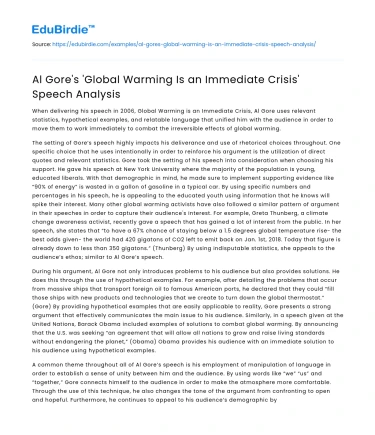When delivering his speech in 2006, Global Warming is an Immediate Crisis, Al Gore uses relevant statistics, hypothetical examples, and relatable language that unified him with the audience in order to move them to work immediately to combat the irreversible effects of global warming.
The setting of Gore’s speech highly impacts his deliverance and use of rhetorical choices throughout. One specific choice that he uses intentionally in order to reinforce his argument is the utilization of direct quotes and relevant statistics. Gore took the setting of his speech into consideration when choosing his support. He gave his speech at New York University where the majority of the population is young, educated liberals. With that demographic in mind, he made sure to implement supporting evidence like “90% of energy” is wasted in a gallon of gasoline in a typical car. By using specific numbers and percentages in his speech, he is appealing to the educated youth using information that he knows will spike their interest. Many other global warming activists have also followed a similar pattern of argument in their speeches in order to capture their audience's interest. For example, Greta Thunberg, a climate change awareness activist, recently gave a speech that has gained a lot of interest from the public. In her speech, she states that “to have a 67% chance of staying below a 1.5 degrees global temperature rise- the best odds given- the world had 420 gigatons of CO2 left to emit back on Jan. 1st, 2018. Today that figure is already down to less than 350 gigatons.” (Thunberg) By using indisputable statistics, she appeals to the audience’s ethos; similar to Al Gore’s speech.
Save your time!
We can take care of your essay
- Proper editing and formatting
- Free revision, title page, and bibliography
- Flexible prices and money-back guarantee
During his argument, Al Gore not only introduces problems to his audience but also provides solutions. He does this through the use of hypothetical examples. For example, after detailing the problems that occur from massive ships that transport foreign oil to famous American ports, he declared that they could “fill those ships with new products and technologies that we create to turn down the global thermostat.” (Gore) By providing hypothetical examples that are easily applicable to reality, Gore presents a strong argument that effectively communicates the main issue to his audience. Similarly, in a speech given at the United Nations, Barack Obama included examples of solutions to combat global warming. By announcing that the U.S. was seeking “an agreement that will allow all nations to grow and raise living standards without endangering the planet,” (Obama) Obama provides his audience with an immediate solution to his audience using hypothetical examples.
A common theme throughout all of Al Gore’s speech is his employment of manipulation of language in order to establish a sense of unity between him and the audience. By using words like “we” “us” and “together,” Gore connects himself to the audience in order to make the atmosphere more comfortable. Through the use of this technique, he also changes the tone of the argument from confronting to open and hopeful. Furthermore, he continues to appeal to his audience’s demographic by referring to America as a democracy, rather than a republic. This attracts his mostly liberal audience. His deliberate choice of language is apparent in this excerpt: “My purpose is not to present a comprehensive and detailed blueprint — for that is a task for our democracy as a whole — but rather to try to shine some light on a pathway through this terra incognita that lies between where we are and where we need to go.” (Gore) Not only does he refer to himself and the audience as a democracy, but he also repeatedly uses the words “we” and “democracy” to establish unity.
Overall, Al Gore’s speech, Global Warming is an Immediate Crisis, was the work of specific rhetoric and evidence-based speaking. This allowed Al Gore to garner a lot of interest in the issue of Global warming, which let him ultimately achieve the goal of raising awareness about the urgent crisis.






 Stuck on your essay?
Stuck on your essay?

